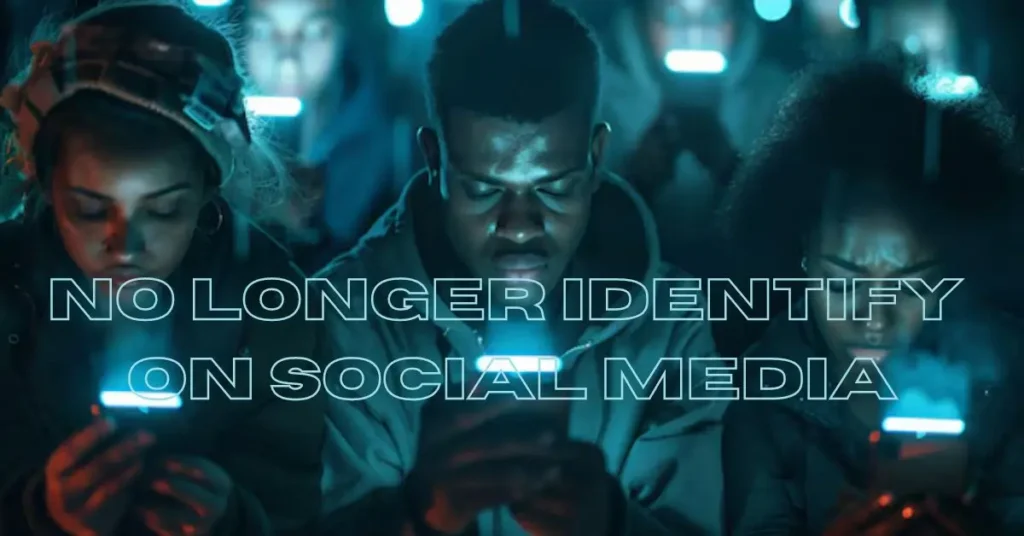The article starts by addressing a noticeable shift in how people interact with social media. As more individuals become aware of the negative effects of constant online engagement, a trend is emerging where people are choosing to maintain anonymity or drastically reduce their social media presence. This trend challenges the idea that a strong online identity is essential for modern living.
- Thesis Statement: The introduction sets the stage by proposing that this shift represents a broader societal movement towards prioritizing mental health, privacy, and authentic connections over digital personas. The article will explore why people are choosing to no longer identify on social media, how they are doing it, and the impact of this decision on their lives and society at large.
1. The Rise of Social Media and Its Impact on Identity
- Historical Context: This section provides a brief history of how social media platforms like Facebook, Twitter, and Instagram have become central to how people present and perceive themselves. It highlights the rapid growth of these platforms and how they have transformed from simple communication tools into powerful engines of personal branding and identity formation.
- The Cult of Personality: Social media has created a culture where self-worth is often measured by the number of likes, followers, and interactions one receives. This section explores how the pressure to curate a perfect online persona can lead to a superficial and sometimes harmful relationship with oneself. It discusses the psychological impact of constantly seeking validation through social media.
- Mental Health Implications: Here, the article delves into the research and data that link social media use to mental health issues such as anxiety, depression, and low self-esteem. It explains how the comparison culture, cyberbullying, and the pressure to always be “on” contribute to these issues, making the case for why some people are choosing to step back from social media entirely.
2. The Movement Towards Anonymity and Digital Minimalism
- Why People Are Choosing Anonymity: This section examines the reasons behind the growing trend of online anonymity. It discusses how concerns about privacy, data breaches, and the misuse of personal information are driving people to limit their digital footprint. It also touches on the desire for more meaningful, real-life connections and the fatigue from constant online interaction.
- Digital Minimalism: Digital minimalism is a lifestyle trend where individuals consciously reduce their digital consumption, including their social media use. This part of the article explains what digital minimalism entails, why it’s gaining popularity, and how it can lead to a more focused, intentional life. It includes insights from experts and examples of how people are practicing digital minimalism.
- Case Studies: To illustrate the movement, the article presents case studies of public figures, influencers, or everyday people who have chosen to step back from social media. These stories provide concrete examples of how and why people are opting out of the social media rat race. The section also discusses the impact of their decisions on their personal and professional lives.
3. The Consequences of No Longer Identifying on Social Media
- Positive Outcomes: This part of the article explores the benefits of reducing or eliminating one’s social media presence. These benefits include increased privacy, reduced stress and anxiety, improved mental health, and more time for personal growth and offline activities. The article presents evidence and testimonials from those who have experienced these positive changes.
- Challenges and Downsides: While there are benefits, there are also challenges to no longer identifying on social media. This section discusses the potential downsides, such as feeling disconnected from friends and trends, missing out on professional networking opportunities, or being excluded from social and cultural conversations that often take place online.
- The Role of Algorithms: Social media platforms rely heavily on user data and engagement to tailor content and advertisements. This section explores what happens when users choose to disengage, how it affects their online experience, and how algorithms might adapt to this trend. It also considers the implications for social media companies if a significant number of users choose to no longer identify or participate actively.
4. How to No Longer Identify on Social Media: Practical Steps
- Evaluating Your Online Presence: The article offers readers a guide to assessing their current social media use. It encourages them to ask themselves why they use social media, what they gain from it, and whether it aligns with their values and goals. This introspection is the first step towards deciding if and how they want to reduce their online presence.
- Setting Boundaries: For those not ready to quit social media entirely, setting boundaries can be an effective way to regain control. This section provides practical tips for limiting time spent on social media, such as scheduling specific times for checking social platforms, turning off notifications, or only using social media for certain purposes like work or staying in touch with close friends.
- Going Anonymous: For those concerned about privacy but not wanting to leave social media entirely, the article suggests ways to go anonymous. This might include creating pseudonymous accounts, limiting the sharing of personal information, and being mindful of what content is posted online. The section also offers advice on how to clean up one’s digital footprint.
- Digital Detox: A digital detox involves taking a break from all digital devices, including social media. This part of the article explains the benefits of a digital detox and provides tips for implementing one, whether it’s for a day, a weekend, or longer. It discusses how a digital detox can help reset one’s relationship with technology and lead to more mindful digital consumption.
5. The Future of Social Media and Personal Identity
- The Shift in Social Media Culture: As more people choose to reduce their social media presence, this section explores how the culture of social media is changing. It discusses the potential for a more privacy-focused, less curated online experience, and how this shift might affect the way people connect and communicate online.
- The Role of Tech Companies: Social media platforms are beginning to recognize the demand for privacy and control over one’s online identity. This section examines how tech companies are responding to this trend, whether through new privacy features, changes to their algorithms, or the development of alternative platforms that prioritize user autonomy.
- Speculations on the Future: Finally, the article speculates on the future of social media. Will we see a rise in platforms that cater to digital minimalists? Will current platforms evolve to meet the needs of users who no longer want to identify publicly? This section offers predictions and insights into where the trend might lead.
6. Conclusion
- Summary of Key Points: The conclusion recaps the main ideas discussed in the article. It reiterates the reasons why people are choosing to no longer identify on social media and the potential benefits and challenges of this decision.
- Final Thoughts: The article closes with a call to action, encouraging readers to evaluate their own social media use and consider whether it’s time for a change. It emphasizes that while social media can be a valuable tool, it’s important to prioritize mental health, privacy, and real-life connections.
FAQs
- Why are people choosing to no longer identify on social media?
- A: People are opting out of social media due to privacy concerns, mental health reasons, and a desire for more meaningful, offline interactions.
- How can I reduce my social media presence without quitting entirely?
- A: Set boundaries on your usage, consider going anonymous, and be intentional about how you engage online.
- What are the benefits of no longer identifying on social media?
- A: Benefits include increased privacy, reduced stress and anxiety, improved mental health, and more time for personal growth and offline activities.
- Will social media platforms adapt to this trend?
- A: Some platforms are already introducing privacy-focused features, but the full adaptation to this trend is still uncertain.
- Is it possible to maintain professional connections without social media?
- A: Yes, through alternative methods like email, professional networking sites, and in-person interactions.







